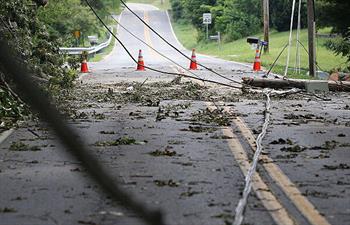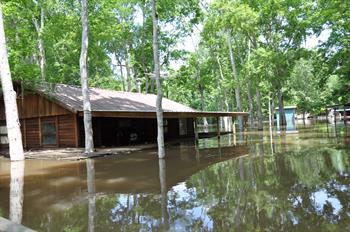-
Before a Storm
Cleco's Severe Weather Survival Guide can help you prepare for weather emergencies. If severe weather is heading your way, consider the following:- If you need to evacuate, do so as early as possible (24 to 36 hours before landfall).
- Check routes: Governor's Office of Homeland Security & Emergency Preparedness
- Consider locations other than public shelters since they are typically crowded.
- Make sure all family members know the evacuation route.
- Ensure automobiles are fueled and are in travel-ready condition.
- Have flashlights, a battery-powered radio and extra batteries. Power and restoration updates are broadcast by the media.
- Photograph or video the inside and outside area around your home for potential insurance needs.
- Make a list of important phone numbers and family contact numbers.
- Put all important documents in a waterproof container.
- Make sure cell phones and other devices are fully charged.
- Plan ahead for medical or special needs.
- Make provisions for a generator and fuel, if needed.
- Have first aid supplies and necessary baby and/or pet items.
- Prepare at least a three-day supply of water. You can fill plastic jugs for drinking and cooking and fill bathtubs for toilet flushing.
- Fill plastic jugs or milk cartons 2/3 full with water and place in freezer. Combination refrigerator/freezers defrost rapidly (keeping time is 12 to 24 hours). Move frozen foods to another freezer if possible. Cover freezers with blankets or quilts to add insulation. Foods should stay frozen for several days if the freezer doors are kept closed.
- Buy foods that do not require refrigeration and can be eaten without heating.
Have charcoal and lighter fluid on hand for grilling and ensure all propane tanks are filled for gas grills. - Close storm shutters or board up windows.
- Secure outdoor patio furniture, toys and other items that could be caught by the wind and either become lost or make contact with people or property.
- Clear recently trimmed or piled limbs and debris.
-
During and After a Storm
- Listen to local radio stations for power outage and restoration status reports.
- Generators should be operated outdoors only and in well-ventilated areas, away from combustible material and kept free of oil, mud and other foreign matter. Plug appliances directly into portable generators with grounded extension cords that can handle the load. Never plug a generator into a wall outlet. It could back feed electricity through your home's wiring to the entire Cleco circuit and cause injury or death to a worker attempting to repair that circuit. Don't exceed the rated capacity of the generator and only refuel when the engine is off and cool.
- Assume all downed power lines are live and stay away. Report downed power lines immediately by calling 1-800-622-6537 and 911. Don't step in nearby puddles or attempt to move any object that comes in contact with a downed power line.
- If water is rising, turn off electricity at the main breaker, evacuate and stay away until waters have completely receded. Have an electrician check the building's wiring before using electricity.
- If your power will be out longer than your freezer will maintain cold, you can put dry ice in the freezer. Don't touch it or breathe the fumes. Put heavy cardboard directly on the packages of frozen food and then put the dry ice on top of the cardboard. Twenty-five pounds should hold the temperature of a half-full 10 cubic foot freezer below freezing for two to three days. Food in a fully loaded freezer will stay frozen for three to four days if the dry ice is put in soon after the power goes off.
-
Downed Power Lines
 If you see downed power lines, treat them as if they are energized. Stay away from the downed power lines, any objects they are touching and areas with debris. Report a downed power line immediately by calling Cleco at 1-800-622-6537 and dial 911.
If you see downed power lines, treat them as if they are energized. Stay away from the downed power lines, any objects they are touching and areas with debris. Report a downed power line immediately by calling Cleco at 1-800-622-6537 and dial 911.- If a power line falls on your car with you inside, stay in the car until help arrives. Do not touch anything outside the car or try to get out. If you must get out, open the door and jump clear of the vehicle without touching the ground and the car at the same time, landing with both feet side by side and then make small shuffled steps until you are a safe distance away.
- Do not climb trees near power lines.
- Electricity can travel down the strings of kites or balloons that become tangled in power lines and cause shock or fire. These kites, balloons or drones should be used in open areas, away from overhead power lines. If a toy becomes tangled in power lines or inside a substation, call the local power company. Do not try to retrieve it.
- Keep metallic balloons inside. They are highly conductive.
-
Flooding
 If water is rising near your home or business, turn off electricity at the main breaker. Evacuate and do not return until waters have completely receded. Wait until the water recedes and have an electrician check the building's wiring before using the electricity.
If water is rising near your home or business, turn off electricity at the main breaker. Evacuate and do not return until waters have completely receded. Wait until the water recedes and have an electrician check the building's wiring before using the electricity.- If electrical appliances and equipment have been under water, allow them to dry out and have them checked out by a qualified repair person before using them.
- When cleaning up after a flood with equipment like a wet-dry vacuum or a pressure washer, do not allow power cord connections to become wet.
-
Generators
Generators, when used correctly, can provide backup power to your home or business in the event of a power outage. Below are some safety tips when using a generator.
Portable generators
Thoroughly read and follow the manufacturer’s instructions for proper use of a portable generator.
Operate the generator in a well-ventilated area, away from combustible material and keep it free of oil, mud, etc.- Never run a generator indoors.
- Plug appliances directly into portable generators with grounded extension cords that can handle the load.
- Don't plug a generator cord directly into a wall outlet. A generator can back feed electricity through your home's electric wiring to the entire Cleco circuit. This can cause injury or even death to a worker attempting to repair that circuit and anyone else who may come into contact with power lines. This also can damage your generator.
- Don't exceed the rated capacity of a generator.
- Only refuel a generator when the engine is off and cool.
Standby generators
This type of generator keeps your power on during an outage. It's installed outside your house and comes on automatically — whether you're home or away. All within seconds of a power outage. They run on propane or natural gas, so there's no refueling.
- Do not tamper with the outside casing, wiring or engine of the generator or attempt to repair it on your own. Call a qualified electrician.
- Make sure your standby generator is installed by a certified installer.
- Schedule regular inspections.